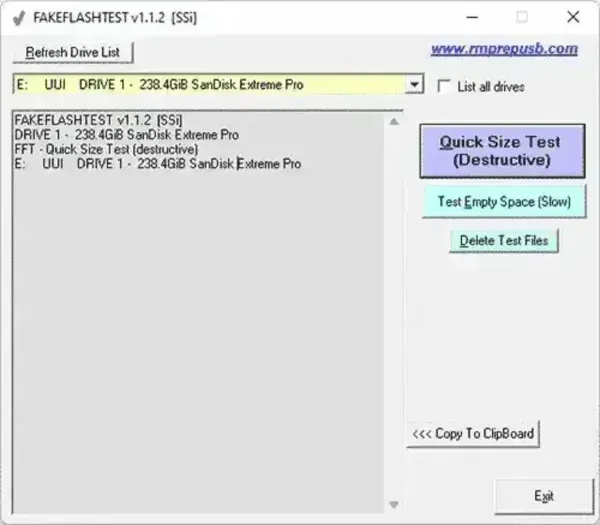FakeFlashTest is a lightweight, portable utility designed to detect fake usb drives, counterfeit USB flash drives and memory cards. These fake storage devices are commonly sold online claiming far greater storage capacity than they actually provide. Using such devices can lead to data loss, corruption, or device failure. This tool can verify the actual storage size of flash drives and SD cards, helping users ensure they receive genuine and reliable devices.
Detecting Fake USB Flash Drives with FakeFlashTest

What Are Fake or Counterfeit Flash Drives?
Fake flash drives, sometimes called bogus USB drives, counterfeit memory cards, or misrepresented storage devices, are often modified at the firmware level to report a false capacity to your operating system. For example, a 32GB drive may be programmed to appear as 128GB. While the drive may initially appear to work, writing data beyond the actual capacity results in data loss or corruption. FakeFlashTest allows you to test these devices and protect your important files.
How a Fake Flash Test Works
This Fake USB flash drive and SD card testing utility provides two types of tests:
- Destructive Quick Size Test: Writes to the entire drive to determine the actual storage capacity. This test overwrites existing data, so back up your files before use.
- Non Destructive Free Space Test: Writes only to empty space, checking for errors without affecting stored data. This helps detect early signs of drive failure or imminent corruption.
Although generally safe, counterfeit drives may still corrupt data during testing. Always backup critical files before performing any tests.
Key Reasons to Use FakeFlashTest
- Verify Flash Drive Authenticity: Detects fake USB flash drives or counterfeit drives by confirming true storage capacity and preventing data loss.
- Prevent Data Corruption: Testing before storing important files ensures your data is safe and avoids potential errors caused by fake drives.
- Check USB/SD Card Reliability: Assesses read/write performance and identifies faulty or deteriorating drives before they fail completely.
- Ensure Data Integrity: Protects against file corruption by identifying devices that misreport capacity or have firmware issues.
- Portable and Lightweight Tool: Run FakeFlashTest directly from a USB drive without installation, making it ideal for IT professionals and casual users alike.
- Multiple Testing Options: Includes read-only, read/write, and random seek tests for thorough evaluation of flash drive authenticity and performance.
Additional Tips for Detecting Fake Flash Drives
- Check the USB flash drive's packaging and brand. Counterfeit drives often have generic labels or unusual fonts.
- Compare reported storage capacity with actual capacity using testing tools to perform a Fake Flash Test.
- Use reliable sources to purchase flash drives, avoiding unusually low-priced devices from unknown vendors.
- Periodically test your flash drives for errors and performance degradation to avoid unexpected data loss.
- Consider checking the drive’s firmware and serial numbers when possible, as counterfeit drives often use duplicate identifiers.
Specifications & Downloading
- File Size: 144 KB
- Author: Steve
- Official Website: Project Page
- Supported Operating Systems: Windows 11, 10, 8, 7
- Price: Free
- Category: Utilities, Counterfeit USB Flash Drive Testing Tools
- Editor’s Rating: ★★★★★
- Download: Get this fake flash drive checker here: FakeFlashTest Download
Alternative Tools to Detect Fake USB
If you want additional verification, consider using H2testw. This tool writes large amounts of test data to your flash drive or memory card and reads it back to confirm actual storage capacity and detect counterfeit devices.
Why It is Important to Check Flash Drive Capacity
Using counterfeit or faulty USB flash drives can lead to unexpected data loss, corrupted files, and device malfunction. FakeFlashTest helps prevent these issues by validating storage capacity, checking for errors, and providing peace of mind that your storage devices are genuine and reliable. It is an essential tool for anyone who frequently uses flash drives or SD cards to store sensitive or critical information.
